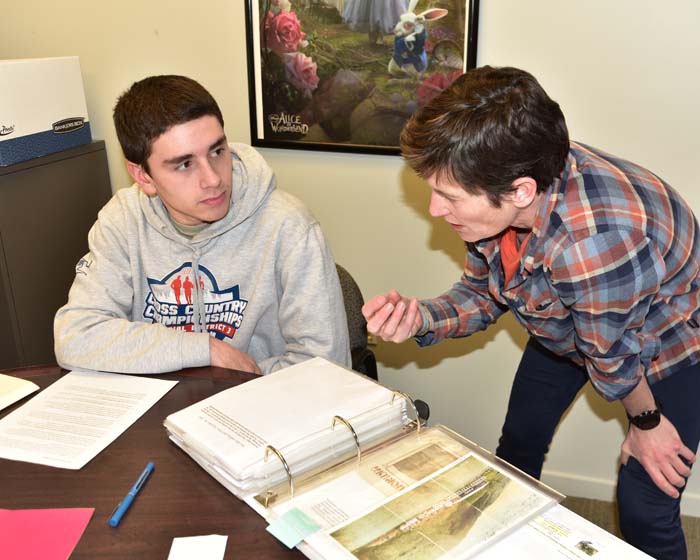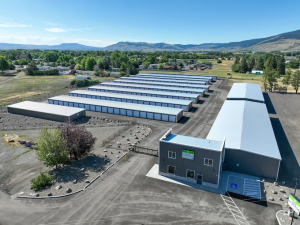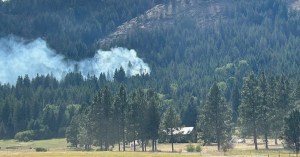Eastern Oregon University students taking a deep dive into Hot Lake’s history
Published 8:00 am Wednesday, March 6, 2024

- Eastern Oregon University history professor Nicole Howard speaks with Terrell Davis on Feb. 14, 2024, about what he is discovering about Hot Lake's history as a student in her Investigating the Past class.
LA GRANDE — Hot Lake’s steamy waters are shallow, but the story of the site features timeless depth.
Trending
The 22 students in Eastern Oregon University’s Investigating the Past class are discovering that this winter. The students are making an in-depth examination of Hot Lake, on Highway 207 between La Grande and Union, and its legacy, based on primary sources of information including blueprints of architectural designs, postcards, journals and photographs.
This means students in Nicole Howard’s undergraduate class are using techniques and approaches for historical research often done at the graduate level, said Howard, a professor of history at EOU.
By studying firsthand sources, students in the class are getting to see Hot Lake’s story via a perspective uncluttered by interpretations and biases of others.
Trending
“They are seeing history through a different lens,” Howard said.
The students are doing more than providing an analysis of primary sources — they are also helping to determine where Hot Lake, which has been in operation since the late 1800s, rates in terms of historical context.
“Our goal as a class has been not just to study these sources, but to try to link Hot Lake’s history to broader historical trends,” said Howard, who noted many of the primary sources have been provided by Dick Roth of Orting, Washington, the author of at least four books about Hot Lake.
Students are looking at things like what type of medical care was provided at Hot Lake, which was a type of health resort in its early history. Mandy Galindo noted that she has found that people coming to Hot Lake were treated for addictions to alcohol and drugs. Howard noted that people were often treated for diseases like rheumatism, a now outdated word for stiffness of muscles and joints.
Operations were provided at Holt Lake for conditions like appendicitis and hand injuries. In addition many babies were delivered there.
No mention has been found of patients with tuberculosis, a disease many people have mistakenly assumed was treated at Hot Lake, Howard said.
The EOU professor said it would have defied logic if people were treated for TB there. She explained that photos and ads indicate that Hot Lake appears to have been a place where people came for rest and enjoyment in the late 1800s and early 1900s when tuberculosis, which is very contagious, was still a dreaded disease.
“Why would you go somewhere where people had TB for a vacation?” Howard said.
Many photographs of the interior of Hot Lake’s buildings in the early 1900s provide images of a comfortable place with an abundance of natural light. This was a common feature at health resorts at the time, Howard said. This reflects just how in step with the times Hot Lake was in terms of providing a healthy environment for people to enjoy and rest comfortably in.
“In a lot of ways Hot Lake was progressive,” she said. “It was not behind the times, that is for sure.”
Teagen DeForest, a student in the Investigating the Past class, said he believes many of those who received medical care at Hot Lake were people who were injured or became ill while they were at the resort. He said relatively few people came to Hot Lake from places like Western Oregon only to receive medical care because the distance was too great.
“It might have been a 14-hour train ride,” DeForest said.
Howard first conceived of the class during a discussion with Mike Rysavy, who owns Hot Lake, now named The Lodge at Hot Lake Springs, with his wife, Tamarah Rysavy. Howard said Mike Rysay was talking to her about the history of resorts in Oregon and wondered where Hot Lake fit into the story.
“It seemed like an interesting question to pursue, not necessarily to prove that Hot Lake was the oldest resort in the state, but to better understand what it meant to be a resort as opposed to a hotel or hospital in the 19th and early 20th centuries,” Howard said.
She noted that Hot Lake began operating as a type of health resort in the 1800s, a time when taking trips for rest and relaxation was a new concept.
“Before then people did not take vacations,” the EOU professor said.
Students in the class will present a report of their findings to Mike and Tamarah Rysavy in March.
The information will have been hard earned. Luna Dennett, a student in Howard’s class, said the process of doing research can be time consuming and tedious, but it also provides a sense of uncommon joy when a key piece of information is found.
“I feel like I am floating,” Dennett said.
Learn more about the varied history of Hot Lake — a longtime hot spot for travelers and patients — at https://hotlakelodge.com/about.









